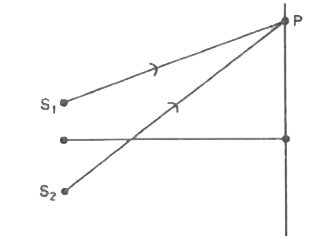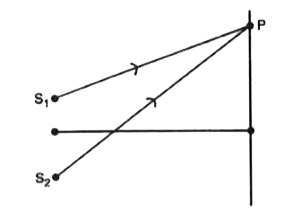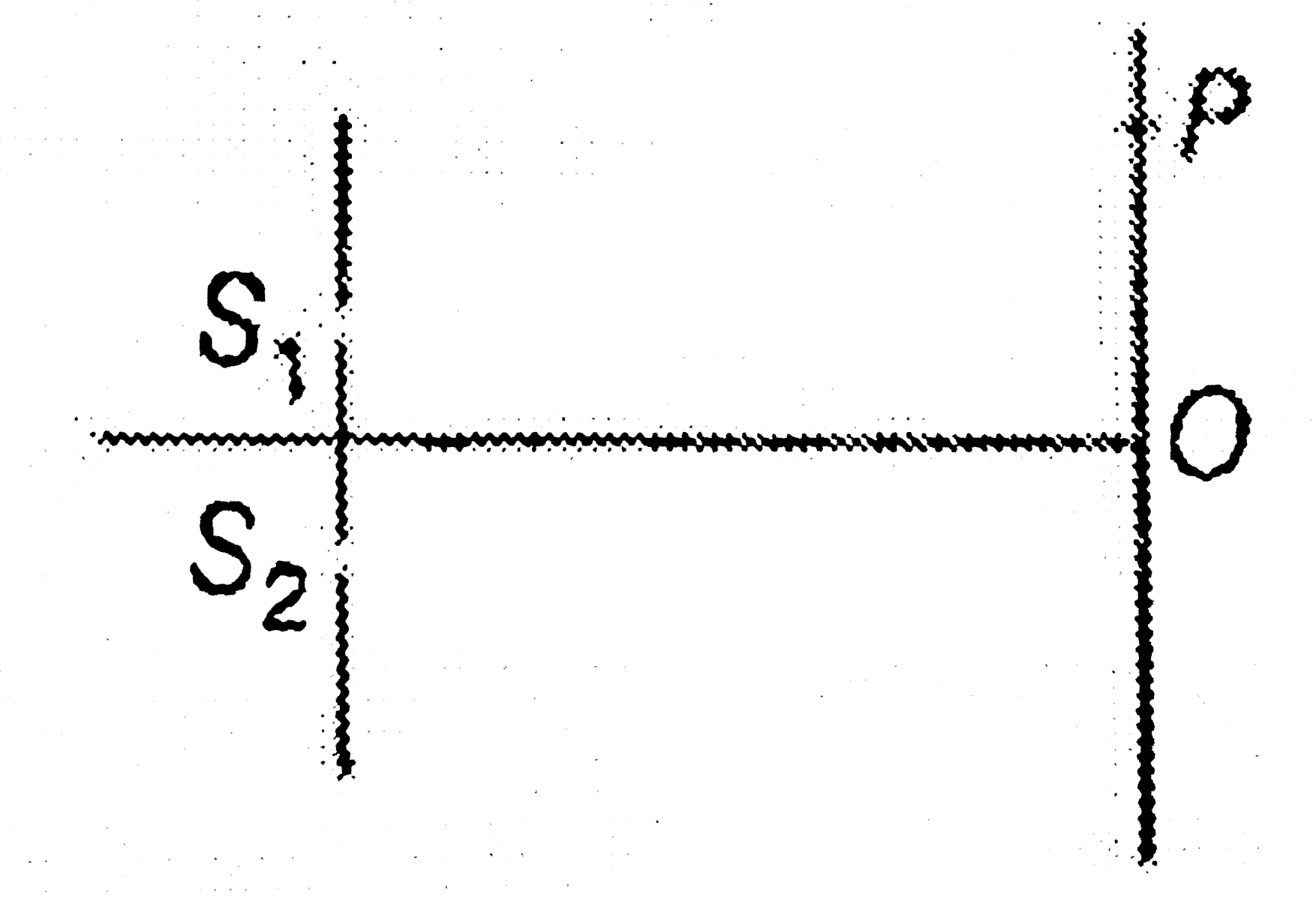In an interference pattern the path difference between waves starting from S1 and S2 and reaching at P is 1.5 microns i.e. S2P−S1P=1.5 microns. If the wavelength of light used be 6000Å, then the point P is :

II nd Max.
II nd Min.
Third min.
Fourth min.
The correct Answer is:C
Path difference = S2P−S1P=1.5×10−6 m
=1.5×10−66×10−7λ ....(i)

In terms of λ,
=2.5λ=(2n−1)λ2...(ii)
∴n=3.
Topper's Solved these Questions
- WAVE OPTICS BOOK - MODERN PUBLICATIONCHAPTER - WAVE OPTICS EXERCISE - MCQ LEVEL- II (ASSERTIONS)
2 Videos
- WAVE OPTICS BOOK - MODERN PUBLICATIONCHAPTER - WAVE OPTICS EXERCISE - MCQ LEVEL- II (PARAGRAPH QUESTIONS)
28 Videos
- WAVE OPTICS BOOK - MODERN PUBLICATIONCHAPTER - WAVE OPTICS EXERCISE - MCQ LEVEL -1 (PARAGRAPH QUESTIONS )
34 Videos
- WAVE MOTIONBOOK - MODERN PUBLICATIONCHAPTER - WAVE MOTIONEXERCISE - RECENT COMPETITIVE QUESTIONS
18 Videos
- WORK , POWER , ENERGY AND COLLISIONSBOOK - MODERN PUBLICATIONCHAPTER - WORK , POWER , ENERGY AND COLLISIONSEXERCISE - Revision Test
40 Videos
Similar Questions
In Young.s double slit interference experiment the wavelength of light used is 6000A0. If the path difference between waves reaching a point P on the screen is 1.5 microns, then at that point P
View SolutionIn the YDSE apparatus shown in figure Δx is the path difference between S2PandS1P. Now a glass slab is introduced in front of S2, then match the following.


View Solution
Knowledge Check
The optical path difference between two waves starting from a monochromatic source of light is (100.5)λ. If the path difference between the waves is 60.3 micron, the wavelength of light used is
A4000 ÅB4500 ÅC6000 ÅD5550 ÅIn Young's double slit intefrence experiment the wavelength of light used is 6000Å . If the path difference between waves reaching a point P on the screen is 1.5 microns, then at that point P
ASecond bright band occursBSecond dark band occurCThird dark band occurDThird bright band occurIn Young's interfernce experiment has a set up as shown in figure, consider that a source of monochromatic light of wavelength 5000Å is placed at S.S1 and S2 are equidistant from S and have equal widths. A wvefront, eit light waves, which superimpose to result in an interference pattern on the screen kept at position (1). this is an experiment where coherent sources are obtained by division of wavefront. O is a point on the screen equidistant from S1andS2. P is a point on the screen 1 mm from O at which path difference between waves from S1andS2 is 11250Å. Position of amy point on the screen can be expressed by θ. The path difference is zero at O and a central bright fringe of intensity I0 is obtained at O. Q is another point 2 mm from O. If the screen is now shifted to a new position (2) [not shown in figure] so that D changes, the fringe width is found to be 50% more than its earlier value and the angular fringe width is 190 radian. Answer the following question [assume D to be large and θ very small so taht sin≈tanθ≈θ]
Q. When the screen is at position (1), phase difference of waves from S1 and S2 at point P is effectively.
 A90∘B120∘C150∘D60∘
A90∘B120∘C150∘D60∘
In the YDSE apparatus shown in figure Δx is the path difference between S2PandS1P. Now a glass slab is introduced in front of S2, then match the following.


View SolutionIn the Young's double slit experiment apparatus shown in figure Δx is P the path difference between S2P and. S1P. Now a glass slab is introduced in front of S2 , then match the following


View SolutionTwo sound waves each of wavelength λ and having the same amplitude A form two sources S1andS2 interfere at a point P. If the path difference S2P−S1P=λ3, then the amplitude of the resultant were at P will be
View SolutionRatio waves originating from sources S1 and S2 having zero phase difference and common wavelength λ will show completely destructive interference at a point P is S1P−S2P is
View SolutionIn Young's double slit experiment, an interference pattern is obtained on a screen by a light of wavelength 6000Å, coming from the coherent sources S1 and S2. At certain point P on the screen third dark fringe is formed. Then the path difference S1P−S2P in microns is
View Solution
